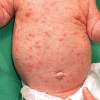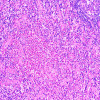
 IJCP Editorial Team
IJCP Editorial Team
Effect of Branch Chain Amino Acid Supplementation on Sarcopenia in Children with Chronic Liver Disease
A double-blind placebo-controlled randomized controlled trial (RCT) was conducted to study the effect of branched-chain amino acid (BCAA) therapy on sarcopenia in 44 children with cirrhosis. The primary objective was to assess the increase in mid-arm muscle area (MAMA) after 12 weeks of BCAA therapy in children with chronic liver disease (CLD) and sarcopenia.
Children aged 6 months to 12 years of age with CLD and sarcopenia (MAMA <-2SD for age) were included in the study. Children with suspected/proven malignancy, those already on BCAA therapy in the last 1 month, noncirrhotic portal hypertension, chronic kidney disease (CKD), post-liver transplantation were excluded from the study.
BCAA was given at a dose of 0.35 g/kg/day in two divided doses; placebo was prepared from puffed rice powder and powdered sugar (similar color, consistency, weight, taste and calories as BCAA). The participants were given nutritional counseling (120-150 kcal/kg/day and proteins 2-3 g/kg/day). Dietary compliance and adherence to intervention were assessed in weekly OPD visits for 4 weeks and fortnightly thereafter.
Comparison of delta change showed that at 12 weeks, there was no difference in delta-MAMA or delta-MAMA Z score between BCAA and placebo groups at 12 weeks.
There was no signifi cant change in the fold expression of the mTOR gene in either group at 3 months.
No signifi cant adverse events occurred except for poor palatability, nausea and vomiting seen in 40% of BCAA and 31% of placebo groups.
The strengths of the study were that it is the fi rst adequately powered doubleblind placebo-controlled RCT on BCAA supplementation in children with CLD. Anthropometric and ultrasound-based parameters are easy to use, can be done at repeated intervals; there is no radiation hazard and no radiological expertise is required.
The limitations of the study were that it did not assess muscle function. The exercise regimen was not incorporated. Administration of BCAA for longer duration might have a signifi cant effect on muscle parameters.
Conclusion: After BCAA supplementation for 12 weeks, there was no signifi cant change in MAMA in comparison to placebo. Baseline pediatric end-stage liver disease signifi cantly predicts resolution of sarcopenia.

IJCP Editorial Team
Comprising seasoned professionals and experts from the medical field, the IJCP editorial team is dedicated to delivering timely and accurate content and thriving to provide attention-grabbing information for the readers. What sets them apart are their diverse expertise, spanning academia, research, and clinical practice, and their dedication to upholding the highest standards of quality and integrity. With a wealth of experience and a commitment to excellence, the IJCP editorial team strives to provide valuable perspectives, the latest trends, and in-depth analyses across various medical domains, all in a way that keeps you interested and engaged.














Please login to comment on this article